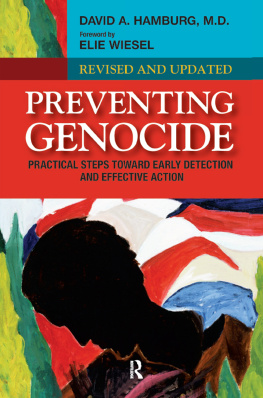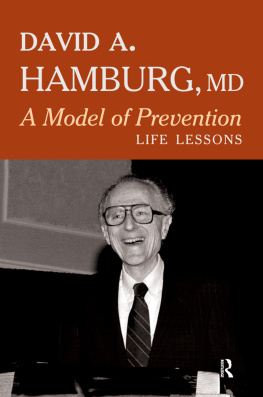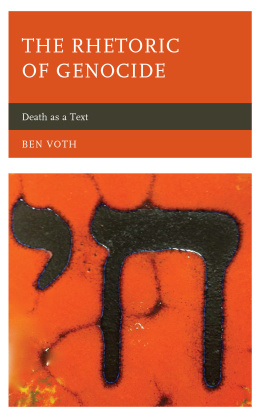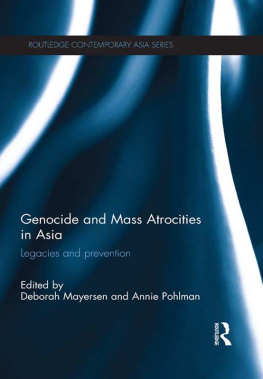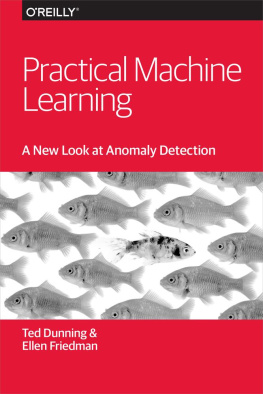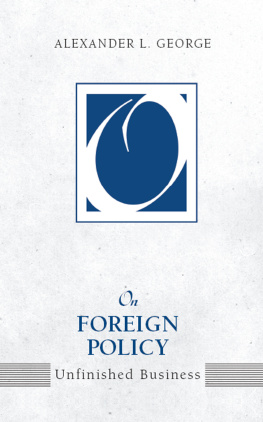Preventing Genocide
Practical Steps Toward Early
Detection and Effective Action
Revised and Updated
David A. Hamburg, M.D.
foreword by Elie Wiesel
First published 2010 by Paradigm Publishers
Published 2016 by Routledge
2 Park Square, Milton Park, Abingdon, Oxon OX14 4RN
711 Third Avenue, New York, NY 10017, USA
Routledge is an imprint of the Taylor & Francis Group, an informa business
Copyright 2010, Taylor & Francis.
All rights reserved. No part of this book may be reprinted or reproduced or utilised in any form or by any electronic, mechanical, or other means, now known or hereafter invented, including photocopying and recording, or in any information storage or retrieval system, without permission in writing from the publishers.
Notice:
Product or corporate names may be trademarks or registered trademarks, and are used only for identification and explanation without intent to infringe.
Library of Congress Cataloging-in-Publication Data
Hamburg, David A., 1925-
Preventing genocide : practical steps toward early detection and effective action /David A. Hamburg, revised and updated.
p. cm.
Includes bibliographical references and index.
ISBN 978-1-59451-558-3 (pbk.)
1. Genocide. 2. GenocidePrevention. I. Title.
HV6322.7.H36 2008
363.34dc22
2007052290
Designed and typeset by Straight Creek Bookmakers
ISBN 13: 978-1-59451-558-3 (pbk)
ISBN 13: 978-1-59451-557-6 (hbk)
With deep respect to a set of people whose insightful, dedicated commitment to prevention of genocide inspired and sustained the whole enterprise:
Alexander George
Elie Wiesel
Kofi Annan
Javier Solana
Desmond Tutu
Noel Lateef
Gareth Evans
Jimmy Carter
Sadako Ogata
Cyrus Vance
Herant Katchadourian
Jack Barchas
Betty Hamburg
Contents
PART II PILLARS OF PREVENTION:
STRATEGIES, TOOLS, AND PRACTICES
PART III INSTITUTIONS AND ORGANIZATIONS:
WHO CAN DO WHAT?
by Elie Wiesel
The unprecedented horrors of the Second World War introduced for all time into our political and ethical lexicon a new word: genocide. It terrifies us by its magnitude. Dictionaries offer a concise definition: systematic destruction of an ethnic group by the extermination of its members. Passing years have made the word ethnic seem too restricted, too limited. It became recognized almost everywhere that the words meaning had to be extended to include religion as well as nationality. To put it differently, destruction of a human group, because of its religious belief or nationality, also constitutes genocide.
And yet, can we conceive of a comparable undertaking that was not planned beforehand? In other words, is planning a genocide or taking the first steps toward genocide part of genocide?
These are important questions when we recall the recent past. In Cambodia under the horrendous and cruel Pol Pot, was it already genocide when, making use of a depraved and perverse ideology, the political leaders professed that they wanted the elimination of only a part of the population?
Similarly for Rwanda. And for Bosnia too, where ethnic cleansing provoked rapes, tortures, and mass murders on a scale that defies classification.
One of the most troubling, if not disconcerting, aspects of the debate on genocide is that in almost every case, it could have been prevented. The examples of Rwanda and Srebenica are proofs of this. In both places, it is undeniable that a well-planned international intervention could have stopped the deaths and saved the numberless victims already condemned. It was not done, and more than one political leader bears responsibility for this.
But in generalsince it is necessary to foresee in order to acthow and by what means, following what analyses, is it possible to locate and identify in advance that monstrous crime against humanity, the attempt to commit genocide?
Those questions, and many others, all weighty and pertinent, are found in this remarkable work, whose importance and urgency cannot be overemphasized.
Its author, Professor David Hamburg, is admirably qualified to address those questions. A thinker of great renown worldwide, he has devoted years to this project, which has almost become his obsession. It is he, more than anyone else, who has succeeded in engaging the highest levels of the United Nations in these problems. For him, it is purely and simply a matter of sounding the alarm to prevent disasters and catastrophes, all works of men who are playing with the danger of genocide in order to attain abominable goals. Anyone who knows Professor Hamburgs life and work will say in a resounding voice, No one is better qualified to show, as he does in this lucid and well-documented book, what to do, what non-violent pressures to use, in order to stop a menace whose deadly shadow already broods over the newborn 21st century.
Teachers and students, diplomats and scholars, the young and the not-so-young, will all find here reasons to discover for themselves the unshakeable courage to hope.
In the short time since this book was published in April 2008, many advances have occurred in terms of preventing genocide and related mass violence. While bearing in mind that the ultimate fulfillment of aspirations in this regard will take decades or generations, there is nevertheless clear evidence of an intellectual and moral ferment in the field. Numerous individuals, groups, governments, and intergovernmental organizations have either undertaken new initiatives or strengthened rudimentary activities in prevention.
One prominent example is provided by President Barack Obama. As a senator and as a presidential candidate, he expressed a strong interest in the problem of genocide. During his 2008 campaign for the White House, Obama repeatedly pledged to respond forcefully to all genocides, including the one currently raging in Darfur. In April 2009, he gave a moving speech on remembrance of the Holocaust. He has yet to translate his words into preventive action, but it is noteworthy that in his formulation of health care reform, he has embraced preventive medicine and public health in the way that these concepts are utilized in this book for the prevention of mass violence.
The basic concepts of prevention are now more widely understood, and they have led to a variety of innovations. In the new concluding chapter to this updated edition, I have discussed a few of these advances to convey the flavor of what is going on. These examples reflect several approaches, regions, and conceptual formulations. Taken together, they cover a good deal, though by no means all, of the prevention field. Some of them show how much can be done in a short time with the proper understanding, initiative, dedication, and courage. Others exemplify building blocks on which step-by-step progress can be envisioned in the next few years. So even though this is a long-term commitment of necessity, the feasibility of useful near-term action is becoming clear. Whatever the distance that has to be traversed, these are signs pointing in the right direction.
The global economic crisis that emerged so vividly in the fall of 2008 will probably slow progress in this as in virtually every other field. Moreover, the severe stress of economic conditions may well exacerbate some intergroup tensions and offer new opportunities for genocidal tyrantsmuch as we saw so vividly in the Great Depression of the 1920s and early 1930s the fall of the democratic Weimar Republic in Germany and the rise of Adolf Hitler.


